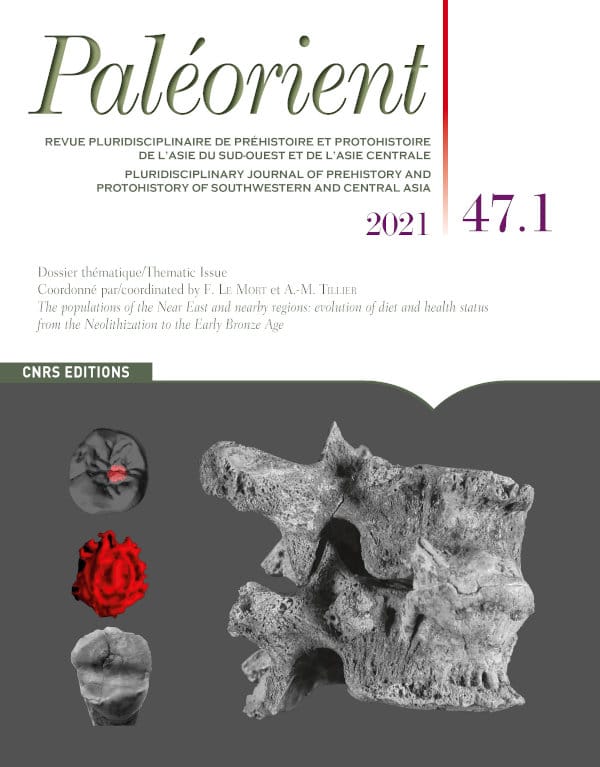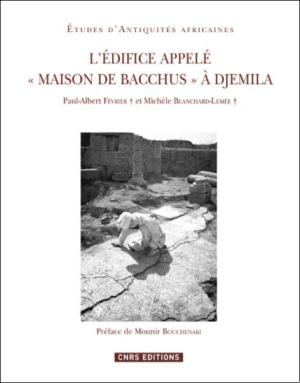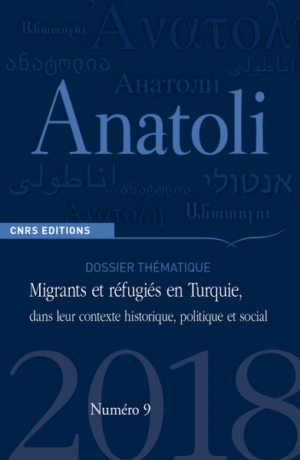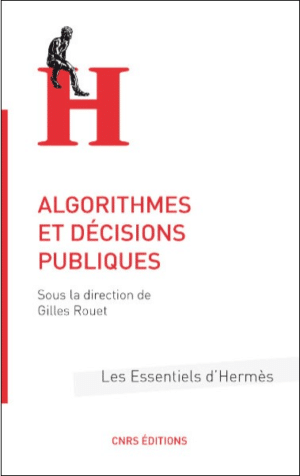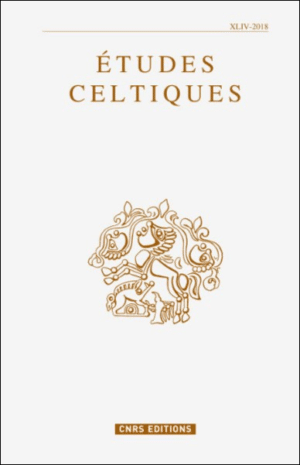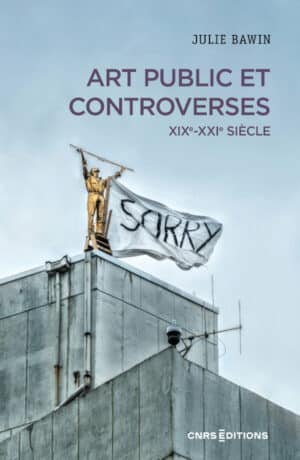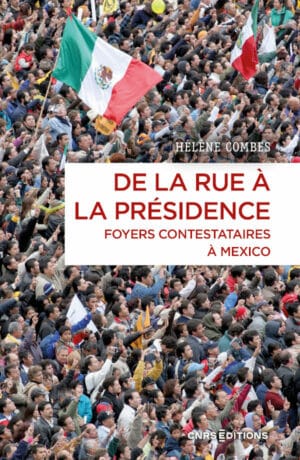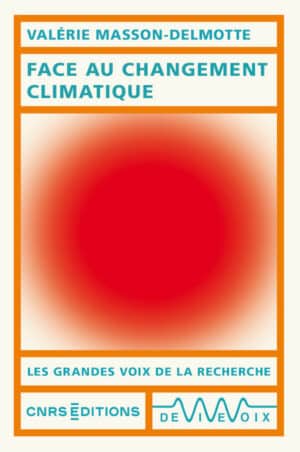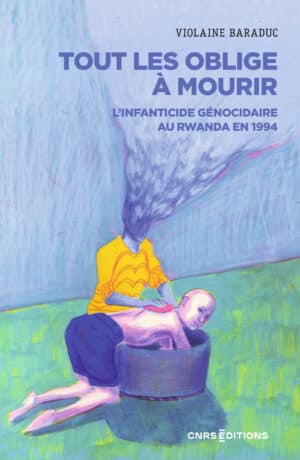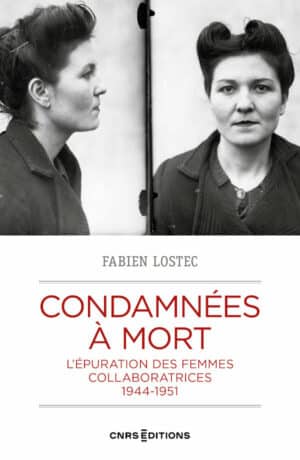In Memoriam
Geneviève Dollfus (1938-2020) par A.-M. Tillier, B. Vandermeersch et V. de Castéja Ofer Bar-Yosef (1937-2020) par B. Vandermeersch, L. Meignen, A.-M. Tillier et F. Valla
Paul Sanlaville (1933-2021) by B. Geyer, R. Dalongeville, S. Muhesen, M. Traboulsi et É. Coqueugniot
Dossier thématique/Thematic issuecoordonné par/coordinated by F. Le Mort and A.-M. Tillier
Les populations du Proche-Orient et des régions voisines :
évolution du régime alimentaire et de l’état de santé de la néolithisation au Bronze ancien
The populations of the Near East and nearby regions:
evolution of diet and health status from the Neolithization to the Early Bronze Age
J. Guilaine, Préface
A.-M. Tillier, Aspects of health status in Pre-Sedentism Populations of Southwestern Asia. Evidence from Qafzeh Site, Lower Galilee
J. Stutz, F. Bocquentin, B. Chamel and M. Anton, The Effects of Early Childhood Stress on Mortality under Neolithization in the Levant: New Perspectives on Health Disparities in the Transition to Agriculture
Hershkovitz, R. Sarig and H. May, Trends in Ancient Populations’ Osteobiography during the Holocene: the Levantine Perspective
Chamel, Dental health status changes during the Neolithisation in Syria: a diachronic perspective (9,820-6,000 cal. BC)J. O. Baker, B. Chamel and O. Dutour, New paleopathological evidence of the presence of tuberculosis in immature skeletal remains from Tell Aswad (8,730-8,290 BC cal., Southern Syria)
F. Le Mort and H. Duday, Probable Diffuse Idiopathic Skeletal Hyperostosis (DISH) in Pre-Pottery Neolithic Cyprus: Evidence from Khirokitia
Y. S. Erdal, Tooth as a Tool: Activity Induced Dental Abrasion in Prehistoric Anatolia
E. Herrscher, M. Poulmarc’h, G. Palumbi, S. Paz, E. Rova, G. Gogochuri, C. Longford, M. Jalabadze,
L. Bitadze, N. Vanishvili, F. Le Mort, C. Chataigner, R. Badalyan and G. André, Dietary practices, cultural and social identity in the Early Bronze Age Southern Caucasus: The case of the Kura-Araxes culture
F. Le Mort et A.-M. Tillier, Conclusion
Recensions
Nakamura S., Adachi T. et Abe M. (éd.) 2019. Decades in Deserts. Essays on Near Eastern Archaeology in honour of Sumio Fujii. Tokyo : Rokuichi Syobou. 362 p. Par W. Abu-Azizeh
Becker J.A., von Wickeded A. (éd.) 2018. Çavi Tarlası: Identität und Kontakt am Beispiel eines spätneolithischen Fundplatzes der Ḥalaf-Zeit, I-II. Berlin: Ex oriente (Bibiliotheca Neolithica Asiae meridionalis et occidentalis). 615 p. Par E. Baudouin
Major J. 2018. Wadi Hammeh 27, Jordan Valley. Natufian Art items, a Contextual Analysis. Berlin: Ex oriente (Bibliotheca neolithica Asiae meridionalis et occidentalis). 372 p. By A. Belfer-Cohen
Levy J. 2020. The Genesis of the Textile Industry from Adorned Nudity to Ritual Regalia. The Changing Role of Fibre Crafts and their Evolving Techniques of Manufacture in the Ancient Near East from the Natufian to the Ghassulian. Oxford: Archaeopress Publishing Ltd. 322 p. Par C. Breniquet
Baumer C. et Novák M. (éd.). 2019. Urban Cultures of Central Asia from the Bronze Age to the Karakhanids. Learnings and conclusions from new archaeological investigations and discoveries. Proceedings of the First International Congress on Central Asian Archaeology held at the University of Bern, 4-6 February 2016. Wiesbaden: Harrassowitz Verlag (Schriften zur vorderasiatischen Archäologie 12). 463 p. Par H.-P. Francfort
Schachner A. 2020. Ausgrabungen in Giricano II: Die chalkolithische Siedlung von Giricano am Oberen Tigris.
Turnhout: Brepols (Subartu XLIV). XX + 202 p. By B. Helwing
Becker J., Beuger C. et Müller-Neuhof B. (éd.) 2019. Human iconography and symbolic meaning in Near Eastern Prehistory. Proceedings of the workshop held at 10th ICAANE in Vienna, April 2016. Vienne : Austrian Academy of Sciences (Oriental and European Archaeology 11). 246 p. Par A. Le Brun
Sauvage M. (éd.) 2020. Atlas historique du Proche-Orient ancien. Beirut and Paris: Institut Français du Proche- Orient and Les Belles Lettres. XVII + 208 p. By D. T. Potts
| Revues | |
|---|---|
| 9782271139597 | |
| Paléorient | |
| 04/10/2021 | |
| 204 | |
| 22 x 28 cm |
« Espace d’échanges entre préhistoriens, archéologues, anthropologues et spécialistes des diverses disciplines liées à l’évolution de l’homme dans son milieu naturel, depuis son apparition jusqu’aux débuts de la civilisation urbaine, Paléorient propose deux fois par an, en anglais et en français, des articles de synthèse, des notes d’information et des recensions, au sein de numéros thématiques parfois. »
OpenEdition Journals, le 16 décembre 2021.
-
Michèle Blanchard-Lemee L’édifice appelé « Maison de Bacchus » à Djemila
-
Catherine Wihtol De Wenden, Elif Aksaz Anatoli n°9
-
Julie Bawin Art public et controverses
-
Hélène Combes De la rue à la présidence
-
Julie Assouly Wes Anderson
-
Samuel Moyn L’affaire Treblinka, 1966
- Anthropologie et mondes contemporains
- Arts et essais littéraires
- Biologie et santé
- Chimie
- Écologie, environnement, sciences de la Terre
- Économie, droit
- Géographie, territoires
- Histoire
- Histoire des sciences
- Linguistique
- Livres audio
- Mathématiques
- Non classé
- Philosophie et histoire des idées
- Physique et astrophysique
- Préhistoire
- Relations internationales
- Revues
- Sciences de l'ingénieur
- Sciences politiques et sociologie
- Sciences religieuses
- Société
-
Valérie Masson-DelmotteFace au changement climatique
-
Violaine BaraducTout les oblige à mourir
-
Fabien LostecCondamnées à mort
-
Claire-Lise GaillardPas sérieux s'abstenir
